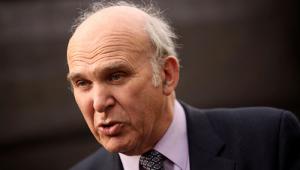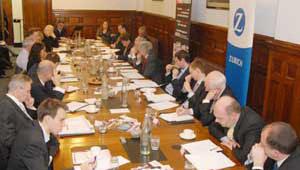10 October 2008
In this first article in a series looking ahead to the Pre-Budget Report, the Liberal Democrats' Vince Cable spells out the steps the chancellor should take to tackle the worst effects of the financial and economic crisis and make the tax system fairer
After the past turbulent month and this week's bailout of high street banks, the financial system and the wider economy are clearly playing a greater role than ever in voters' perceptions of politicians' competence.
It is clear that over the past year the damage done to Gordon Brown's reputation for economic management has been irreparable. The dithering over Northern Rock; the bungled changes to capital gains tax; and, most damaging of all, the forced reversal over the 10p tax rate, have topped the list of blunders and U-turns.
The hubris that led Brown to proclaim the end of 'boom and bust' has been blown away as the economy, and particularly the housing market, progresses once more on that wearily familiar path. Food and energy have soared, pushing inflation well above the Bank of England's 2% target. Debt and mortgage repayments have become unaffordable for growing numbers and we are threatened with a wave of repossessions.
The global financial turmoil of recent weeks, with the second nationalisation of a British bank (Bradford & Bingley) in just over a year and the semi-nationalisation of many more, has put the focus on the banking system, overshadowing more traditional aspects of the financial calendar such as the upcoming Pre-Budget Report. The Banking Reform Bill, with its long overdue improvements to the protection of savers' deposits and to the finance and banking system, was introduced to the House of Commons this week.
This week marked a historic period for the British economy. The government's £50bn rescue plan for the banks means that it is no longer justifiable to impose aggressive repossession policies on homeowners and insolvency policies on businesses. The short-term bonus-driven ethos must end, starting with bonuses for bank board members, who should be ensuring the stability of banks over the next decade, rather than maximising profit over the next few months. The obligations banks have to the public must change for good.
What makes the government position so awkward, however, is that when Chancellor Alistair Darling stands up in the Commons to announce the PBR, his fiscal options will be entirely hamstrung by the yawning black hole in the public finances. He has no real scope for manoeuvre. Freefalling house prices will be reflected in stamp duty tax receipts, while rising unemployment and poor business growth will depress income and corporation tax receipts – all exacerbating an already tight fiscal position. Many people will be studying Darling's growth forecasts for statistical confirmation of a recession. After two quarters of stagnation, it is inevitable that we will see a serious downgrading of the forecasts in April.
The government's fiscal rules themselves have already lost credibility and, at the time of writing, rumour is rife that they will be revised. After being repeatedly fiddled with, they will not be trusted as long as ministers set their own tests and mark them. The rules need to be reinforced by ensuring that the definitions of the economic cycle and performance are assessed independently of government, by the National Audit Office or a body of comparable authority.
So what can and should Darling do from within his fiscal straitjacket? High on the list will be the next step in the government's humiliating U-turn on the 10p tax rate. More than a million people are still losing out from Brown's decision to put short-lived political interests above the needs of low- and middle-income earners by abolishing the 10p rate in his final Budget as chancellor. We have still had no reassurance as to whether the increase in personal allowances will continue in the next financial year or what other assistance will be given to families struggling with higher tax bills in the face of rising food, energy and mortgage costs. Furthermore, the reversal of this policy disaster has itself placed further pressure on the public finances, costing the government £2.7bn in borrowing.
Pressure will also fall on the chancellor to announce a package of reforms to help hard-pressed homeowners. For months he has been using the PBR as his get-out clause to avoid making any real announcements, and pressure is high for him to finally bite the bullet.
As families struggle to meet rising costs, it is critical that the government prevents a wave of repossessions. Under the Conservatives, 420,000 people lost their homes between 1992 and 1997. That not only aggravated the crash in the housing market because of distress selling, but also caused a wave of homelessness and knock-on effects on demand for social housing. The government must take this opportunity to ensure that repossession is used only as a last resort.
At present, the mortgage lenders have a perfectly sensible code of conduct to limit repossessions – but it is voluntary and does not apply to the cowboys in the industry. It should be binding. The courts must ensure that before any bank is granted a repossession order they must first be required to offer the mortgage holder independent financial advice. Following that, the bank should offer a range of repayment possibilities, including shared equity and rental arrangements.
It is, however, inevitable that some people will lose their homes, placing yet more strain on council house waiting lists, already at 1.7 million, with large numbers of new private properties unsellable. Councils and housing associations should be given the authority and financial freedom to buy these unsold properties to use for social housing.
The government must also act to help households on low incomes, especially pensioners, who will be badly hit by rising gas and electricity bills. The full effect will be felt this winter, which allows time to head off a big surge in fuel poverty. While Brown's £910m package of measures, announced last month, was a step in the right direction, the government should have demanded more from the energy companies, which have benefited hugely from the free allocation of permits under the European Carbon Trading Scheme.
I don't believe that there is any easy solution like a 'windfall tax' – which would ultimately be paid by consumers. However, energy companies should be required to introduce meaningful social tariffs for low-income consumers, many of whom use meters that cost more than paying by direct debit. The government should also demand an aggressive programme of energy conservation, getting the companies used to the idea that they will be rewarded for producing less, not more, energy.
On the day of the PBR, we will see Conservative shadow chancellor George Osborne respond with the familiar jibe that the government 'failed to fix the roof when the sun was shining'. But the truth is that every year the Tories have called for more spending and tax cuts. They will say, too, that they have warned of the dangers of rising personal debt for years. In truth, Osborne never mentioned the words 'personal debt' in Parliament before last year. Furthermore, in these hard-pressed times the only tax cuts the Tories promise are in inheritance tax for dead millionaires.
Given the constraint on the public finances, Darling would do well to look at ways of tightening his fiscal belt. He should start by recouping just some of the billions of pounds lost in legal tax avoidance every year. For example, Revenue & Customs estimates that between £10bn and £40bn was lost in 2005. At the Liberal Democrat party conference in September, we proposed steps to crack down on loopholes in capital gains tax, stamp duty and non-domicile rules, forcing the super rich to pay their fair share.
But we would go even further than this, cutting some £20bn in wasteful spending. For example, we would scrap identity cards and abolish the Department for Enterprise and Regulatory Reform, redirecting saved funds towards our spending priorities. Any money that is left over would be ploughed back in tax cuts for low- and middle-income earners who need it most. This is on top of our pledge to cut the basic rate of tax by 4p in the pound, paid for by closing loopholes that benefit the very wealthy and environmental taxes.
I would like Darling to use the PBR as an opportunity to increase fairness by changing a tax system that still takes a higher proportion of your income in tax if you are poor than if you are rich. I am destined to be disappointed.
The economy and the public finances are both in a worrying state. There are no easy answers. But there are things that can be done to deliver a fairer system. They require decisive leadership, a quality that has been missing from the government. If Brown is to survive, now is the time for him to act.
Vince Cable is the Liberal Democrat deputy leader and Treasury spokesman
PFoct2008



















